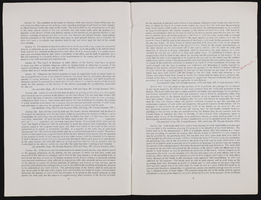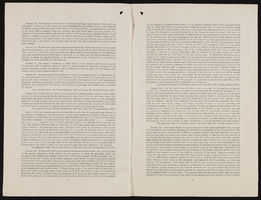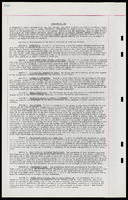Search the Special Collections and Archives Portal
Search Results

Transcript of interview with Hazel Du Barton by Anne D. Barton, November 13, 1979
Date
Archival Collection
Description
On November 13, 1979, Anne Du Barton interviewed her mother, Hazel F. Du Barton (born Hazel F. Wingebach on July 13th, 1926 in Floral Park, New York) in their home in Las Vegas, Nevada. Mrs. Du Barton relocated to Las Vegas in 1955. This interview covers Las Vegas history, including local politics, nuclear testing, and the Helldorado Parade. Occupations Mrs. Du Barton has held include dress designer, dressmaker, clerical worker, bookkeeper, and hotel manager. She recalls her first experience camping at Mount Charleston and she was also an arts and crafts camp instructor for Campfire Girls, who used the campsite at Lee Canyon.
Text
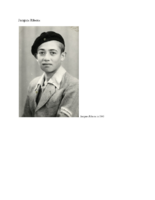
Biographical essay by Jacques Ribons, 2014
Date
Archival Collection
Description
Jacques Ribons describes his life during the Nazi occupation of Poland. During the liquidation of the Jewish ghetto, his family decided to turn themselves in to the Germans. They were sent to a prison and separated. He and his brother survived and went to France with the OSE, and came to the United States in 1947.
Text

Meeting minutes for Consolidated Student Senate, University of Nevada, Las Vegas, August 05, 1980
Date
Archival Collection
Description
Text

Transcript of interview with Lyla Joy Ford by Anne Cope, March 12, 1975
Date
Archival Collection
Description
Text
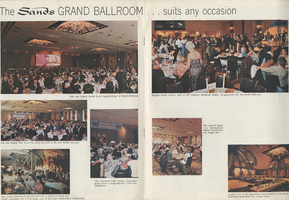
14th Anniversary Issue of the Sands Times from the Sands Hotel and Casino, December 1966
Date
Archival Collection
Description
The 14th anniversary issue of the Sands Times magazine from the Sands Hotel and Casino in Las Vegas, Nevada. Articles written in the magazine describe various events held at the Sands, entertainment news, and celebrity appearances.
Mixed Content

Transcript of interview with Sari and Paul Aizley by Claytee D. White, November 4, 2016
Date
Archival Collection
Description
As Sari and Paul Aizley recall their separate childhoods and journeys to Las Vegas, their work and volunteer histories, their efforts to build a better society, and their life together they speak to each other as much as they respond to questions about their observations on the growth of the Las Vegas urban environment and their contributions to Southern Nevada's cultural development and a just society. In this interview, Sari and Paul speak to the cross-town commute and the physical UNLV campus in the late 1960s; the growth of the UNLV Math Department; the evolution of UNLV's Continuing Education; the State's North-South funding rivalry as reflected in the built environments of University of Nevada in Las Vegas and in Reno; plans to build a paleontology research facility at Tule Springs National Monument; the Review-Journal's "Ask Jessie Emmet" Real Estate column; local ACLU offices and politics; Fair Housing; transgendered persons; the Nevada State Assembly, and Class! magazine for Clark County high school students. Sari and Paul smile at each other as they recall how the editor/publisher met the bearded math professor and fell in love—despite the fact that they tell slightly different versions of their initial meeting(s). Sari passed away November 1, 2017, three days shy of one year after she participated in this interview.
Text

Transcript of interview with Ron Lurie by Barbara Tabach, June 5, 2015
Date
Archival Collection
Description
Interview with Ron Lurie by Barbara Tabach on June 5, 2015. In this interview, Lurie discusses his family and his time in politics, campaigning for office, and some of his accomplishments while in office as mayor and in the city council. He also talks about growing up in Las Vegas and attending Las Vegas High School, and working for his father, Art Lurie, in the grocery store business.
Ron Lurie was a rambunctious teenager when the Lurie family moved to Las Vegas from California. He adapted quickly to Las Vegas and made fast friends. He is a 1958 graduate of Las Vegas High School. His father, Art Lurie, a supermarket businessman, was also a well-known professional boxing judge and a former Nevada Athletic Commission chair. In 1987 Ron became the first person of Jewish ancestry to be elected Mayor of Las Vegas. Previously, he was fourteen year member of the Las Vegas City Council and served on many community boards and commissions. Since political office was not a fulltime position, Ron's career path developed in a couple of different ways. He tells the story of becoming a butcher and the opportunities he experienced becoming a successful salesman of gaming machines for Si Redd, IGT and others. His over three decade gaming career continues as of this oral history. He is executive vice president and general manager of Arizona Charlie's Decatur location. In this oral history he reflects on some of his political accomplishments as mayor and city councilman. He also served six years on the State of Nevada Wildlife Commission and is a member of the Fraternity of the Desert Bighorn.
Text

